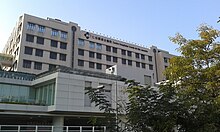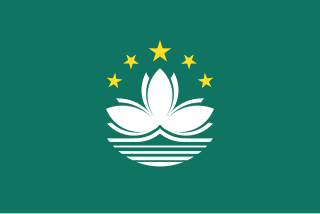
Macau or Macao, officially the Macao Special Administrative Region of the People's Republic of China (MSAR), is a city and special administrative region of China in the western Pearl River Delta by the South China Sea. With a population of about 680,000 and an area of 32.9 km2 (12.7 sq mi), it is the most densely populated region in the world.

Coloane is a former island in Macau that is united with the island of Taipa by an area of reclaimed land known as Cotai. It is located at the southern part of Macau. Administratively, the boundaries of the traditional civil parish of São Francisco Xavier are coterminous with that of Coloane.

São Lázaro is the smallest civil parish of Macau, located in the central-east region of the Macau Peninsula. It is surrounded by the parishes of Nossa Senhora de Fátima, Santo António, and Sé.
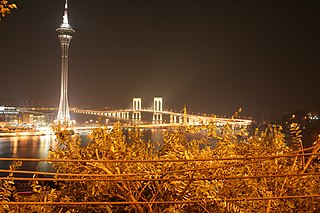
Sé is a southeast civil parish in the Macau Peninsula of Macau. It is the second largest peninsular district in Macau after the civil parish of Nossa Senhora de Fátima. The parish area is named for the Igreja da Sé.

Primary care is the day-to-day healthcare given by a health care provider. Typically this provider acts as the first contact and principal point of continuing care for patients within a healthcare system, and coordinates other specialist care that the patient may need. Patients commonly receive primary care from professionals such as a primary care physician, a physician assistant,a Physical Therapist, or a nurse practitioner. In some localities, such a professional may be a registered nurse, a pharmacist, a clinical officer, or an Ayurvedic or other traditional medicine professional. Depending on the nature of the health condition, patients may then be referred for secondary or tertiary care.

A clinic is a health facility that is primarily focused on the care of outpatients. Clinics can be privately operated or publicly managed and funded. They typically cover the primary care needs of populations in local communities, in contrast to larger hospitals which offer more specialized treatments and admit inpatients for overnight stays.
Health care in Ireland is delivered through public and private healthcare. The public health care system is governed by the Health Act 2004, which established a new body to be responsible for providing health and personal social services to everyone living in Ireland – the Health Service Executive. The new national health service came into being officially on 1 January 2005; however the new structures are currently in the process of being established as the reform programme continues. In addition to the public-sector, there is also a large private healthcare market.
A public hospital, or government hospital, is a hospital which is government owned and is fully funded by the government and operates solely off the money that is collected from taxpayers to fund healthcare initiatives. In some countries, this type of hospital provides medical care free of charge to patients, covering expenses and wages by government reimbursement.

Conde S. Januário Hospital is an acute care district general hospital run by the public sector in Sé, Macau.

Healthcare in the United Kingdom is a devolved matter, with England, Northern Ireland, Scotland and Wales each having their own systems of publicly funded healthcare, funded by and accountable to separate governments and parliaments, together with smaller private sector and voluntary provision. As a result of each country having different policies and priorities, a variety of differences have developed between these systems since devolution.

Macau has a universally accessible single-payer system funded by taxes collected by the government from corporations and residents.
Alberta Health Services (AHS) which is headquartered in Edmonton, Alberta is the single health authority for the Canadian province of Alberta and the "largest integrated provincial health care system" in Canada. AHS delivers medical care on behalf of the provincial Government of Alberta Ministry of Health It operates 850 facilities throughout the province, including hospitals, clinics, continuing care facilities, mental health facilities and community health sites, that provide a variety of programs and services. AHS is the largest employer in the province of Alberta. In 2019, AHS served 4.3 million Albertans with a staff of 125,000 staff and 10,000 physicians, and an annual budget of $15.365 billion. Mauro Chies is the interim President and CEO of AHS and reports to Dr. John Cowell, the AHS Official Administrator. The Official Administrator is accountable to the Minister of Health and the Premier.

Spain operates a universal health care system. According to the Organisation for Economic Co-operation and Development, total health spending accounted for 9.4% of GDP in Spain in 2011, slightly above the OECD average of 9.3%. The Spanish health care system is ranked as the 7th most efficient healthcare in the world, as indicated in the year 2000 in a report by the World Health Organization. Spain's healthcare system ranks 19th in Europe according to the 2018 Euro health consumer index. Spain is ranked 1st in the world in organ transplants.
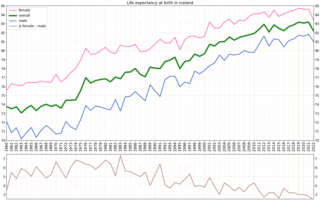
Iceland has a state-centred, publicly funded universal healthcare system and health insurance that covers the whole population. The number of private providers in Iceland has increased. The healthcare system is largely paid for by taxes (84%) and to some extent by service fees (16%) and is administrated by the Ministry of Health. A considerable portion of government spending is assigned to healthcare. There is almost no private health insurance in Iceland and no private hospitals. In very limited cases, access to a private provider can be reimbursement for services provided that the conditions are met.

A healthcare center, health center, or community health center is one of a network of clinics staffed by a group of general practitioners and nurses providing healthcare services to people in a certain area. Typical services covered are family practice and dental care, but some clinics have expanded greatly and can include internal medicine, pediatric, women’s care, family planning, pharmacy, optometry, laboratory testing, and more. In countries with universal healthcare, most people use the healthcare centers. In countries without universal healthcare, the clients include the uninsured, underinsured, low-income or those living in areas where little access to primary health care is available. In the Central and East Europe, bigger health centers are commonly called policlinics.
This article provides a brief overview of the health care systems of the world, sorted by continent.
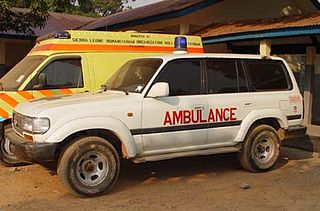
Healthcare in Sierra Leone is generally charged for and is provided by a mixture of government, private and non-governmental organizations (NGOs). There are over 100 NGOs operating in the health care sector in Sierra Leone. The Ministry of Health and Sanitation is responsible for organizing health care and after the end of the civil war the ministry changed to a decentralized structure of health provision to try to increase its coverage.
Life expectancy in Fiji is 66 years for men and 72 years for women. Maternal mortality was 59 per 100 000 live births in 2013.
The Health Bureau in Macau is mainly responsible for coordinating the activities between the public and private organisations in the area of public health, and assure the health of citizens through specialised and primary health care services, as well as disease prevention and health promotion.
